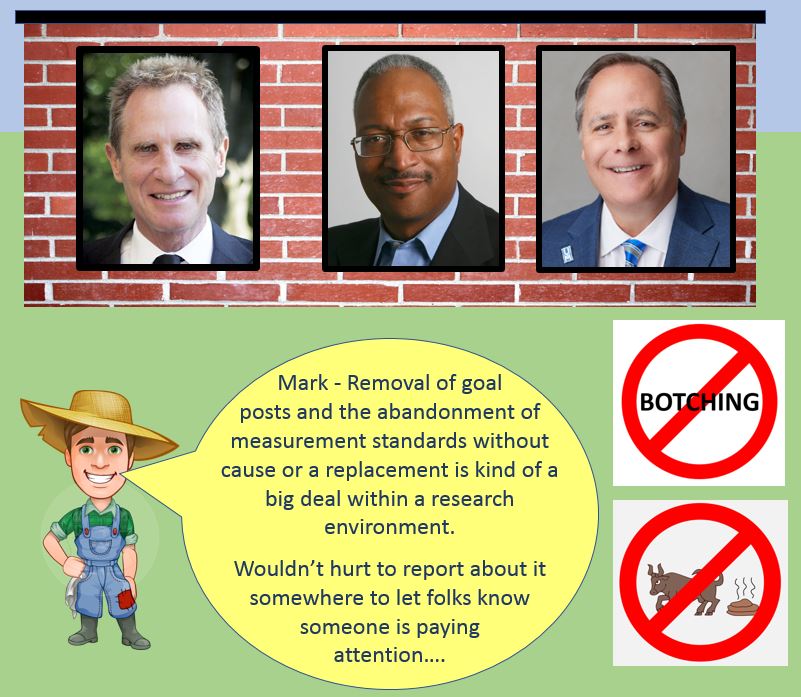Memphis lacks the institutional vitality to grow resulting in a rigged system with deficient corporate community and university leadership, press and legislative oversight.
This blog overall attempts to educate ignorant educated Memphians that the culturally normed decline by design framework under the FedEx/Memphis Tomorrow complex is far from normal. To do this, the blog creates awareness around often technical subject matter regarding the dismissal of core tenants that support community checks and balances. Checks and balances provide a basis for course correction of taxpayer funded initiatives thereby avoiding persistent decline. But through a lack of check and balances, the FedEx/Memphis Tomorrow complex has, in many ways, invested the community in a culture of decline which the press rarely if ever confronts.
Some have referred to my thematic assertions as “ramblings”. Ramblings are fine with me when it comes to consistently asserting that the FedEx/Memphis Tomorrow complex is down in every category over twenty years – as their initiatives feast upon Federal, State and Local tax dollars – all while transferring wealth from a community in need to corporate/real estate interests that benefit the small few at a estimated taxpayer cost of $500M.
But back to technical subject matter. Examples of technical subject matter addressed by this blog overall include: 1) bogus EDGE projection accounting to justify excessive corporate/real estate abatements 2) botched workforce development initiatives, 3) benchmarking excessive tax abatements against peer cities and 4) measuring economic development outcomes all of which the local press dare not do….
The Press
Measuring economic outcomes involves comparing Memphis to peer cities based on a collection of city peers as established by an authoritative source like the University of Memphis (U of M). So when the U of M abandoned their publicly available peer city research parameters as they pursue Carnegie Research 1 status without cause, I was taken back.
Given this occurrence, I reached out to Mark Russell at the Commercial Appeal to write an editorial which I have successfully done on 2 previous occasions. Mark openly greeted the offer and said he would edit the piece on the following Monday when he returned from weekend vacation. I thought, while welcoming Russell’s editing, that the piece was a go.
As I was open to edits, clean up and needed clarification which is typical, Russell returned with a completely different tone than I have never experienced. Without any journalistic curiosity, Russell declined to run the piece on the basis of incoherence while newly copying a Dann Miller with a Gannett email address in his communication.
Upon looking up Miller on the web, he is associated with the Tennessean out of Nashville. The shift in Russell’s tone was rather dramatic, signaling to me anyway, that somebody got to Russell. This has happened before when the CA published an editorial of mine only to have Russell strangely come back and edit the editorial with a pro Memphis Tomorrow correction even though I had a reference to the contrary. Here is the entire communication between Russell and me (scroll to the bottom for conversation sequence).
The thesis of the rejected submission was coherent involving the public U of M’s removal of economic development measurement standards, as a public resource, thus robbing the community of a needed system check. Russell dismissed these concerns as “ramblings”. These ramblings reference the type of core tenants that are constantly being peeled away by local community leaders to sustain the status quo of decline while robbing the community of needed system checks. These systemic manipulations come in the form of mistaken data, bogus accounting, moved goal posts, goal post removal and etc.
All the while, the local press rarely reports on the above, seemingly fearful of questioning Memphis power centers. The only investigative reporting that questions Memphis power centers is being originated by local bloggers and outside organizations like ProPublica and The Beacon Center of Tennessee.
In the meantime, Ryan Poe spent all week analyzing the politics of the Harris veto; seemingly the very politics that Harris cares nothing about. At the same time, no one in the press dare question U of M Board of Trustee leadership after the U of M touted the promise of economic thought and investigative journalistic leadership under the new Board.
At any rate, here are some examples of issues going unreported and/or uninvestigated by local press staff writers:
FedEx/Memphis Tomorrow corporate community leadership complex down in all categories over 20 years while their initiatives leverage Federal, State and Local tax dollars
Botched workforce development system by the FedEx/Memphis Tomorrow complex over 4 years costing taxpayers $20-30M per year on the back of a Canadian contract award while stifling small business (Probably the biggest botch of all since lagging employment growth can be shown as the most costly variable contributing to lagging total wage growth).
Bogus EDGE retention PILOT accounting over 8 years while justifying excessive PILOT costing taxpayers $100M
Excessive job PILOTS costing taxpayers $200M which includes both retention PILOTs above and new job PILOTs (Samuel Hardiman thankfully wrote an article about Mayor Harris concern on this matter but without investigative analysis on quantitative excess.)
Reporting on measurement of the economic development complex vs. peer cities showing below average total wage growth and cost to taxpayers of $250M since 2010
Gutting of public comment in EDGE minutes
Following up with the County Commission on why the evaluation of all 9 abating boards has not been scheduled per the Commission approved resolution
Following up with local leaders on the absence of an economic and workforce development plan as excessive tax incentives continue
Reporting on the configuration of abating boards that are incented to represent corporate/real estate interests over the taxpayer based on being paid fee revenue based on the abatement size
Conclusion
All of this to say, without needed corporate community and university leadership, press and legislative oversight that questions Memphis power centers, decline will likely continue. But as a wrap up, here is a shout out to Mark Russell through an Allman Brothers song:


